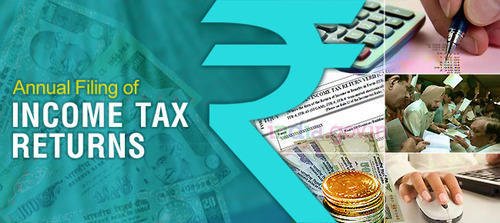2019 Income Tax Return: What should taxpayers remember when submitting an ITR?

2019 Income Tax Return: What should taxpayers remember when submitting an ITR?
Income Tax Return submission 2019: With the extension of CBDT, individuals now have time to submit their income tax returns for the fiscal year 2018-19 by August 31, 2019. However, taxpayers should be cautious despite the relaxation of tax filing deadlines. If there is a tax payable, an additional month will be imposed.

The following are some of the key aspects that individuals should be aware of when filing an income tax return:
A permanent account number (PAN) is mandatory and should be correctly mentioned in the return. If a person’s total income exceeds 50,000 rupees and the filing form is submitted electronically, the return must be submitted electronically, and a person’s mobile number and email ID must be mentioned.
The determination of the state of the home is a necessary basic check. This is based on the number of days you stay in India. Please make sure this can be verified by passport stamping. The Aadhaar number is also mandatory (only for non-resident evaluators, foreign citizens, super seniors and people living in specific areas such as Assam, Jammu and Kashmir and Meghalaya). The Aadhaar number should be associated with the resident PAN.

Salaried employees with a total income of less than Rs. 500,000, individuals and seniors need to submit a tax return using the Form ITR 1 (individuals are eligible to become residents, neither a director of the company nor unlisted equity, no capital gains/exceeds A property/agricultural income of more than 5,000 rupees/foreign assets, etc.) Non-Indian residents, with overseas assets, taxpayers with a total income exceeding INR of 500,000 rupees, capital gains, more than one property, brought losses, more than 5,000 rupees Agricultural income needs to be submitted to the ITR 2 form.
The taxpayer is a partner of the company / has an operating income to submit an ITR 3 form, and a resident taxpayer who chooses a hypothetical income plan with a total income of up to Rs. 500,000 is required to submit an ITR 4 form.
All exempt income is reported in the income tax return. Please note that the ITR 2 form now requires separate disclosure of the stated waiver. The relevant part of the request for an exemption also needs to be disclosed. Employees should ensure that the exemptions reported in Form 16 (Part B) issued by the employer are verified and correctly reflected in their tax returns.
Taxpayers should review their Form 26AS (Annual Tax Credit Statement) and consider the taxes collected from the source/taxes withheld from employers and others. The tax department also offers the option to prepare and file tax returns directly from the tax department portal. Before submission, Form 16 / Form 16A and Form 26AS should be used to verify pre-filled income (including salary) and TDS.

All savings bank accounts held by individuals who have not been dormant for at least 3 years will be mentioned in the return with the IFSC code. If you request a refund on your tax return, be sure to indicate your preferred bank account on the tax portal and pre-verify your bank account.
Individuals traveling from other countries or owning assets and/or income must be extra cautious about the tax revenues and disclosures required for returns. If a reduction is required in the return under a tax treaty, a more comprehensive disclosure of the resident and the general resident (ROR) is required. These will be supported by the Tax Residence Certificate (TRC) or the applicable Form 67. In the case of a later stage of inquiries, the tax authorities should fully support the basis of relief and the value of relief/exemption in return.
Taxpayers with a total income of more than Rs. 500,000 need to report their assets and liabilities in India on March 31, regardless of their residency status in India. If taxpayers are eligible to become RORs, they need to report Indian and overseas assets and liabilities.
The income of each responsible person should be properly calculated by the recently revised bill. For example, if the income exceeds Rs. 1,00,000, the long-term capital gains from the sale/redemption of stocks/mutual funds should be taxed. In many cases, it may also be necessary to rely on judicial priority.
All income should be considered and taxed or exempted as appropriate. For example, even if the amount is small, the interest of the savings bank must be reported. There are several waivers available for investment or donations/costs incurred. These should be properly analyzed as they provide an effective basis for reducing taxable income. For example, for savings bank interest that is not older, you can deduct up to 10,000 rupees. However, seniors can apply for a savings of up to 50,000 rupees for savings bank interest, post office deposits, and bank deposits.
Finally, the individual must verify in the tax return that the information is given in the return and the timetable is correct and complete. Tax laws provide for prosecution of false verifications, and individuals either know or believe to be false. The focus is on full disclosure. Taxpayers are advised to provide the correct information to avoid giving reasons/clarifications or may face criminal consequences for future application.
- income tax
- Income Tax 20199
- Income Tax 2020
- Income Tax Return
- Income Tax Return 2019
- Income Tax Return 2020
- ITR
- ITR 2019
- ITR 2020
- Tax Return 2019

Expert Installation: Tips for Choosing Air Conditioning in Brisbane

How to Maintain a Rotary Vane Air Compressor

Pet Hospital Logo Design Samples

Top 5 Tips for Starting Online Makeup Store in Pakistan

ICC Men's T20 World Cup Warm-up Matches 2026 – Oman Team PNG Photos (High Resolution Download)

ICC Men's T20 World Cup Warm-up Matches 2026 – Scotland Team PNG Photos (High Resolution Download)

Sri Lanka vs Pakistan – Rivalry, History & Match Preview

